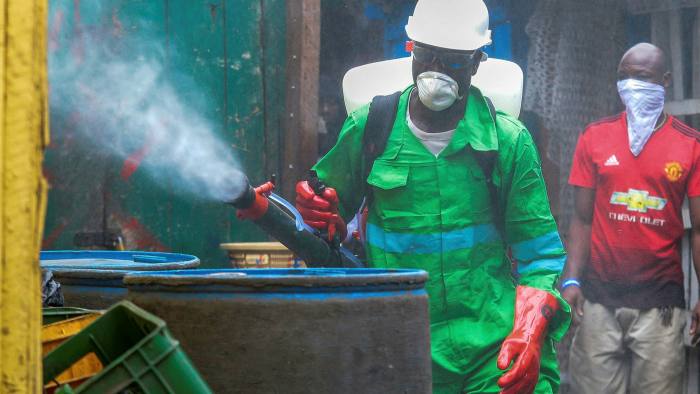Africa has reached a “break the glass moment”, an emergency in which international actors need to take drastic action if the world’s poorest continent is to avoid a human and economic catastrophe, Ken Ofori-Atta, Ghana’s finance minister, told the Financial Times.
Mr Ofori-Atta, who is also chairman of the joint World Bank-IMF Development Committee, said the two institutions had acted swiftly, but would need to do much more. They should provide governments with liquidity support as well as money to fight the virus and debt relief, he said, adding that the coronavirus threatened to overwhelm Africa’s inadequate health systems.
Last month, Bill Gates warned that the pandemic could kill 10m Africans if it were allowed to rip through the continent and Imperial College London published a study saying that, if governments failed to act, the virus could claim 40m lives worldwide. Mr Ofori-Atta said the pandemic would also cause economic havoc.
It could wipe out 5-10 per cent of Africa’s gross domestic product at a stroke, he said, as commodity prices sank and receipts from tourism, trade and remittances shrivelled. Moody’s on the weekend cut South Africa’s debt rating to junk, ending the investment-credit rating it had had for 25 years.
Tito Mboweni, South Africa’s finance minister, said: “To say we are not concerned and trembling in our boots about what might be in the coming weeks and months is an understatement.” Ken Ofori-Atta, Ghana’s finance minister, warned that the pandemic could wipe out 10% of Africa’s gross domestic product © Bloomberg Abebe Selassie, director of IMF’s Africa department, said the continent faced its deepest economic challenge in several generations.
Bilateral lenders should consider immediate debt relief, he said, while the IMF would waive debt payments for the poorest countries. African governments must temporarily abandon fiscal austerity, Mr Abebe added. “Even with constrained fiscal space, the right thing to do is to expand fiscal deficits to counter the immediate impact of the shock.” Mr Ofori-Atta last week co-chaired a meeting in which African finance ministers called for a $100bn stimulus package.
The IMF said it was making $50bn available for emerging countries, with $10bn for low-income countries.
Mr Ofori-Atta said the poorest countries would be eligible to receive up to 50 per cent of their IMF quota — a formula that determines voting rights — but that this needed to quadruple to 200 per cent. “The Fund and World Bank are moving quickly, the sentiments I hear from G20 finance ministers are in the right direction,” he said. “But we need to increase the pace and increase the amounts.”
By the time of the World Bank-IMF spring meetings in mid-April he expected “we should be able to have an even more comprehensive and aggressive posture”.
Charles Robertson, chief economist at Renaissance Capital, said African economies would suffer a double hit: a collapse in revenue and a need to ramp up spending both on emergency health measures and to counter the economic impact of lockdown measures.
Ethiopia’s prime minister Abiy Ahmed told the Financial Times last week that if coronavirus were not controlled in Africa it would quickly bounce back to the rest of the world.
What coronavirus will mean for Africa Subtitles unavailable Mr Ofori-Atta said that trying to contain coronavirus through lockdowns in a continent where most people were under 30 and many lived from hand to mouth threatened mass unrest.
Social distancing was almost impossible when millions depended on going out each day to earn a living and bought food from crowded markets. Ghana has nevertheless imposed a lockdown on its two main regions, including Accra, the capital, from Monday.
South Africa’s police have resorted to tear gas to disperse crowds since a lockdown there on Friday. In Kinshasa, capital of the Democratic Republic of Congo, there were reports of police beating people with canes as they tried to get on crowded buses. Several countries, including Kenya, have imposed a curfew.
Mr Ofori-Atta said Ghana, considered one of Africa’s most stable and best-run economies, would need to spend 0.5-1 per cent of GDP to bolster a health service that had proportionately one-tenth the number of hospital staff as Britain.
It would also have to consider direct cash transfers — via electronic payments to mobile phones — to protect people from destitution. Ghana was relatively lucky because it had a $900m stabilisation fund from oil revenues and had in January managed to issue a $3bn Eurobond.
“Without it, we would have been in tatters completely,” he said, noting that markets had now slammed shut to African issuers.
The African Development Bank on Friday said it had placed a $3bn three-year “Fight Covid-19” social bond carrying a 0.75 per cent coupon.
That showed there was a way back to the debt markets for African sovereigns, Mr Ofori-Atta said.
Latest Stories
-
How tactless NDC exonerated the Electoral Commission
10 minutes -
Tiger Woods’ son Charlie, 15, hits first hole-in-one
17 minutes -
‘¢25m is just a drop in the ocean’ – WAEC on delayed results
22 minutes -
NPP’s Central Regional Chair, Robert Kutin dead
28 minutes -
Global Football Festival promises football museum and music experience on December 27
30 minutes -
Saudi warnings about market attack suspect were ignored
31 minutes -
Trump threatens to try to regain control of Panama Canal
38 minutes -
Court orders police to determine gender of accused
43 minutes -
Ghana’s gold production to rise marginally by 3% in 2025 – Deloitte
46 minutes -
A man’s suicide leads to clamour around India’s dowry law
46 minutes -
Asante Gold Corporation enters into $500m agreement with Fujairah Holdings LLC
51 minutes -
ECG Power Queens support Ho Female Prison
2 hours -
Don’t appoint a new EC Chair; allow Jean Mensa to work – Prof. Stephen Adei to Mahama
2 hours -
Bayer Leverkusen’s Jeremie Frimpong arrives in Ghana for visit
3 hours -
‘It will be disastrous if Mahama removes the Chief Justice’ – Prof. Stephen Adei
3 hours

